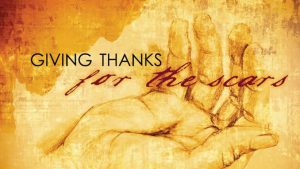
Pastor Rich Knight
Central Congregational Church
May 9, 2021
Psalm 119:71-72
It is good for me that I was humbled so that I might learn your statutes.
The law of your mouth is better to me than thousands of gold and silver pieces.
II Corinthians 12:6-10
But if I wish to boast, I will not be a fool, for I will be speaking the truth. But I refrain from it, so that no one may think better of me than what is seen in me or heard from me, even considering the exceptional character of the revelations. Therefore, to keep me from being too elated, a thorn was given me in the flesh, a messenger of Satan to torment me, to keep me from being too elated. Three times I appealed to the Lord about this, that it would leave me, but he said to me, “My grace is sufficient for you, for power is made perfect in weakness.” So, I will boast all the more gladly of my weaknesses, so that the power of Christ may dwell in me. Therefore I am content with weaknesses, insults, hardships, persecutions, and calamities for the sake of Christ; for whenever I am weak, then I am strong.
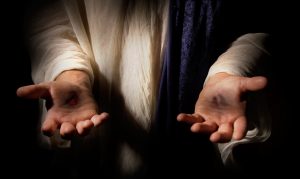
Last Sunday we looked at Jesus’ Scars, and the fact that he kept them following his resurrection. That’s how the disciples recognized him. Today, I’d like us to think about our scars – not in a “Let’s dwell on our pain” kind-of-way, but in terms of what we can learn from our scars.
First, think about the difference between wounds and scars.
I once heard a funeral director say to a family – “This loss will leave a scar. But you can live with scars. You can’t live with an open wound, but you can live with scars.”
That rings true to me.
Illustration. Last June 1st, I was helping one of my sons move, and hidden inside one of the bags was a tool he uses for art projects. I believe it’s called a “hot knife.” It was invented by Satan. It’s a small, pointed utility knife that heats up. It’s a weapon, and I was its victim. My son didn’t wrap it very well, and I didn’t know it was in this bag that I picked up, and somehow I got stabbed in the knee. It hurt like heck and it bled like heck. It was very tender for the next 2-3 months jordan luka 3 colorways release dates, but the wound healed, and turned into a scar. Today can run, hike, play tennis & basketball and not even think about it. There’s only one movement that causes pain – bending down and putting weight on it. My point is the injury has gone from a wound to a scar.
You can live with scars. There might have a tenderness now & then and cause some pain, but it’s manageable. A lot of healing has taken place.
Here’s another illustration.
Today’s a day where we all think of our mothers. If our mothers are living, we thank them. If they are no longer on this earth, we miss them, and, we might even feel some deep sadness today. Some might take flowers to a cemetery and have a good cry. But it’s different from the all the crying one does in the early stages of grief – because it’s a scar, and not an open wound (unless it’s been fairly recent).
Let me make another point about wounds and scars.
There are two extremes that I think we need to avoid, if we can.
One is to continually dwell on our wounds and scars, feeling them so deeply, over and over again, as if they just happened. I’ll bet we’ve all done this at one point or another. Often it’s a sign that it’s still a wound and not a scar.
Illustration. Long ago in a galaxy far, far away, I was visiting a member of the church I was serving. He was an older gentleman whose marriage had broken up more than 20 years prior to our conversation. But you would have thought it happened yesterday. He blamed himself for the break-up, and this still devastated him years later. In several visits with him, it was pretty clear that he had not forgiven himself for the break-up of the marriage, and he was still stuck in that 20 years later. It was still a wound, and not a scar. When that happens, we need to talk to someone, we have work to do – in this gentleman’s case – grief work and forgiveness work, and spiritual work, allowing in God’s grace. So, when something still feels so fresh and it impedes our lives, we have some work to do.
Lewis Smedes once said: “Own your past, so your past doesn’t own you.”
We could say today, “Own your scars, so your scars don’t own you.”
Now, of course the other extreme is ignoring our wounds, never talking about them, and always trying to suppress the pain.
Illustration. Growing up I knew a family who’d had a terrible tragedy. I was good friends with one of the sons – he never spoke about it. Another friend of mine knew one of his brothers – and he also never talk about it. That also may suggest that it was still an open wound and not a scar. You put compression on a wound right when it happens, but eventually you have to take it off and take a close look at the wound.
It seems to me that the Apostle Paul had the right balance – He acknowledged his wounds and scars, but he didn’t dwell on them. He wrote about his “Thorn in the flesh” that he asked three times for God to remove it. We don’t know exactly what it was, but we do know that the healing didn’t come. Paul wrote about his struggles to the Corinthians, but he never mentions it again in the other 12 letters of his that are included in the NT.
He owned his “thorn in the side,” but it didn’t own him.
You see the same thing in Romans 8. He acknowledges his hardships, but is able to frame them in faith and in the lessons learned.
Who will separate us from the love of Christ? Will hardship, or distress, or persecution, or famine, or nakedness, or peril, or sword? . . . No, in all these things we are more than conquerors Женские бежевые сникерсы на платформе танкетке зимние кроссовки теплые на меху эко-кожа зима — цена 1480 грн в каталоге Сникеры ✓ Купить женские вещи по доступной цене на Шафе , Украина #175819778 through him who loved us. For I am convinced that neither death, nor life, nor angels, nor rulers, nor things present, nor things to come, nor powers, nor height, nor depth, nor anything else in all creation, will be able to separate us from the love of God in Christ Jesus our Lord. (Rom. 8:35, 37-39)
Paul’s hardships drove him to God, and God proved faithful
And that’s what wounds and scars can do.
The suffering led him into a deeper walk with God.
Let me list some of the blessings of our scars.
- That’s the first one – Suffering can lead us into a deeper walk with God.
Psalm 119:71 – It is good for me that I was humbled, so that I might learn your statutes.
It is good for me that I was humbled, so that I might learn your ways, O God.
Illustration. The Willow Creek Church in Chicago is one of the largest in the country. Over 10,000 people attend each Sunday. Although they’ve had some challenges in recent years, one of their strengths is they’ve never stopped trying to learn, grow and improve. So they took a survey of their members a few years ago and asked them, what has helped you the most when it comes to spiritual growth? – sermons, small groups, prayer meetings, books, concerts, service projects? All good stuff – but the number one answer was, Suffering.
Suffering often forces us to decide,
- “Do I believe in a good and loving God, or do I not?”
- “Do I trust God, or do I not?”
- “Do I trust God’s promises, or do I not?”
- “Do I believe that God’s grace is sufficient for me?”
God often teaches us the deepest truths in the darkest valleys.
We enjoy the mountaintops a whole lot more, but often life’s greatest lessons are learned in the valley of the shadow.
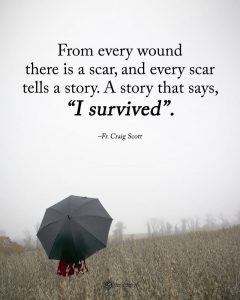
- Another benefit of scars is that our scars are a reminder that healing has taken place.
I can look at the scar on my leg and say quite sadly and bitterly, “Well, there goes my shot at a career modeling shorts for the LL Bean catalogs, all because of that Satanic Hot Knife!” Or, I can say, “Yeah, that hurt, but it doesn’t stop me today. Healing has taken place. Strength has been regained.”
Our scars stay with us, but they don’t define us; they don’t own us, because healing has taken place.
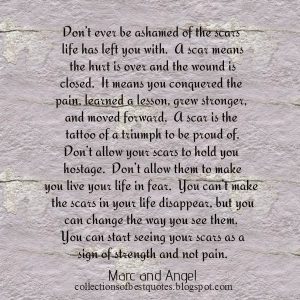
- One last benefit of scars is, they have a way of making us real, of helping us get in touch with the depth of human experience in a way that our victories can’t.
Illustration. I’d like to tell you about a high school friend of mine that I’ll call, “Dave.” (not his real name)
When Dave was in high school he was Mr. Perfect. He was a brilliant student. Today he has a Ph.D. in molecular biology. In addition, he was a superb athlete – a stand-out on the soccer field and on the basketball court. And he made it look easy. I never remember seeing him sweat. He was always calm, (very, very) cool, and collected. And what’s more – he was devastatingly handsome. Picture an actor today or from the past that you consider handsome, and then picture what he might have looked like at age 18. That was David. Mr. Perfect.
Fast forward 25 years. It’s our 25th high school reunion. A guy comes up and says hi and his nametag says, “David.” And I’m thinking, this guy switched nametags with someone. There’s no way that David . . . but it was! He had long, long hair – probably the hair he wanted in the 70’s but his parents wouldn’t let him. He had a scruffy beard, and he was very overweight. And I said to myself, “I am in better shape than Mr. Perfect!” Imagine how awful I felt when David told me that he had MS, Multiple Sclerosis; and that’s why he couldn’t exercise the way he once did. Later on I found out that he had been through a divorce. That had to have been very hard on David, because he had seldom known failure. His Dad was a Southern Baptist Pastor.
I happen to sit at the same table with David at dinner and for much of the evening, and he was a different person. He was relaxed, kind, and gentle. He really wanted to know how each person at the table was doing. Towards the end of the night, the Vice President of our Class said to David, “You know, I was so intimidated by you in high school. I was afraid to even talk to you.” Three other people at the same time said, “Me, too.” I couldn’t ever remember having conversation with David in high school. He said, “Was I a jerk? Was I unfriendly?” People jordan 1 mid linen said, “No, but you weren’t exactly approachable. You were so perfect.”
In talking with David at 2 more reunions, it’s clear that he’s very different from the guy we knew in high school. He’s real. Genuine. Interested. Kind. Humble. What made the difference? Scars. He wasn’t perfect anymore and he didn’t have to pretend to be. The Scars of MS and divorce had remade him, and they had remade him for the better.
I wouldn’t wish MS or divorce on anyone (especially having gone through the latter), and I’m not saying God gave him those hardships so God could improve him. I’m saying, in the midst of those hardships, David allowed God to remake him.
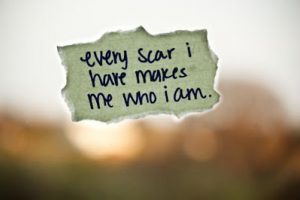
Illustration. The Velveteen Rabbit by Margery Williams Bianco expresses this same idea.
“Real isn’t how you are made,’ said the Skin Horse. ‘It’s a thing that happens to you. When a child loves you for a long, long time, not just to play with, but REALLY loves you, then you become Real.’
‘Does it hurt?’ asked the Rabbit.
‘Sometimes,’ said the Skin Horse, for he was always truthful. ‘When you are Real you don’t mind being hurt.’
‘Does it happen all at once, like being wound up,’ he asked, ‘or bit by bit?’
‘It doesn’t happen all at once,’ said the Skin Horse. ‘You become. It takes a long time. That’s why it doesn’t happen often to people who break easily, or have sharp edges, or who have to be carefully kept. Generally, by the time you are Real, most of your hair has been loved off, and your eyes drop out and you get loose in the joints and very shabby. But these things don’t matter at all, because once you are Real you can’t be ugly, except to people who don’t understand.”
Our scars have a way of making us real.
In closing,
Think again about the fact that Jesus kept his scars.
We can face and accept our scars because Jesus accepted his
We can live with our scars because Jesus lives with his.
We can thrive with our scars because Jesus rose to new life on Easter Sunday with his scars still in place.
And, we can trust Jesus to accept us, scars and all, because he knows all about scars.
Think about it.
Val King and Byran Norman then sang, “Thankful for the Scars” by I Am They.
Click here to here the song.

Benediction
Elizabeth Kubler Ross: “The most beautiful people we have known are those who have known defeat, known suffering, known struggle, known loss, and have found their way out of the depths. These persons have an appreciation, a sensitivity adidas for big and tall 3 stripes tricot pants size - SchaferandweinerShops KR - ‘Superstar Boot’ sneakers adidas for Originals, and an understanding of life that fills them with compassion, gentleness, and a deep loving concern. Beautiful people do not just happen.”
May the Grace of our Lord Jesus Christ – the Scarred and Risen One,
And the Love of God our Creator,
And the Strength, Joy, and Healing of the Holy Spirit
Be with You this Day and Always.
Amen.
